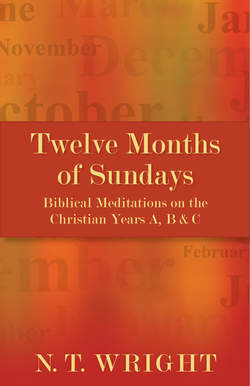Читать книгу Twelve Months of Sundays - N.T. Wright - Страница 39
На сайте Литреса книга снята с продажи.
ОглавлениеThe Fifth Sunday of Easter
Acts 7.55–60
1 Peter 2.2–10
John 14.1–14
I’m never quite sure what Jesus meant when he said ‘you will do greater works than these, because I am going to the Father’. But I’m quite sure he did not mean ‘you will do lesser works than these’. An old cliché; but those who used to say ‘expect great things from God; attempt great things for God’ had John on their side far more than those who, by implication at least, simply want a place on the sidelines where a few little Christian activities can take place without causing a fuss. As the world continues to reveal its powerlessness in the face of evil, is it not time to take Jesus at his word?
The promise is flanked by others, equally remarkable. Many dwelling-places, furnished and ready. Knowing the Father – seeing the Father, even, something nobody expected to do and live – is found through looking at Jesus. And the simple and overwhelming promise about prayer: whatever you ask in my name, I will do it. Much standard Christianity, in all sections and parties of the Church, has adjusted the focus just enough so that, instead of seeing all this clearly, we get the general picture but it’s all rather blurred. We aren’t really sure about our final destiny. We don’t really expect to attain the vision of God by looking long and hard at Jesus (or why would we do anything else?). And we don’t pray for solid, substantial definite things that will bring the Father glory in the Son.
The great statements earlier in the chapter are likewise at a discount in our half-hearted, lukewarm-blooded Christianities. Jesus, we are told, couldn’t have said that he was the way, the truth and the life. Many now make that denial the shibboleth of a new orthodoxy. (What this amounts to, of course, is the statement that the Enlightenment, or perhaps postmodernity, is ‘the way, the truth and the life’; is that any less ‘arrogant’, the charge normally advanced against John 14.6?) We don’t want our own worldview disturbed by someone telling us that Jesus has upstaged it all.
Which was, of course, what Stephen did with the world-view of the chief priests and the hardline Pharisees. The Temple is under judgement, he said; Israel has always rejected its heaven-sent rulers, and has now done so again, once and for all. That would have been arrogant, fighting talk if it weren’t for the fact that it was Jesus he was talking about; as it was, it was suffering, forgiving talk. In the great Jewish tradition of martyrdom, the dying called down curses on their persecutors; the first Christian martyr followed his Lord in praying for their forgiveness. But forgiveness wasn’t what they wanted (despite the fact that this was what the Temple stood for!); they wanted their worldview left intact. That’s the stuff that stonings are made of. But God has laid in Zion the true corner stone, precious beyond imagining to those who believe.
